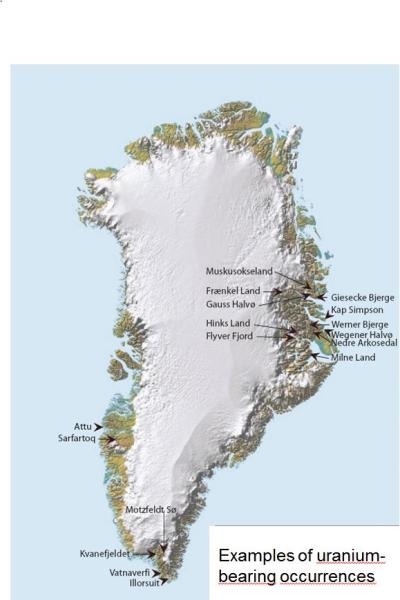Elections in Greenland delay uranium legislation
Greenland’s uranium policy is once again in the limelight with the upcoming elections on 28 November. There are big economic interests at stake if uranium can be mined in a profitable way, but a nuclear regulatory system has to be put in place first.
Greenland and Denmark set up a working group to wipe out legislative grey zones. The elections have temporarily halted the work of this group – and efforts may be delayed further if a referendum on uranium mining becomes a part of the election campaign.
But if the Greenlanders move on with uranium mining, it is imperative that a policy outlining uranium non-proliferation along with legislation is in place, says Cindy Vestergaard, researcher at the Danish Institute for International Studies and head of the international Governing Uranium-project.
- They are starting from zero. Meeting international obligations requires a joint control system so that both countries can monitor the quantity of uranium mined, how much is exported, and to which countries. Nobody expects Greenland to ship off uranium to Iran or North Korea in defiance of UN sanctions, but a non-proliferation policy needs to be in place.
- The biggest policy issue for Greenland and Denmark will be how they will reconcile the Kingdom’s non-nuclear self-image with its nuclear past and potential future as a uranium exporting state. It will have to ensure that domestic legislation is in line with Denmark’s foreign policy commitments such as that of the Nuclear Non-proliferation Treaty (NPT), the Additional Protocol, and the Nuclear Suppliers Group (NSG), but also to consider how it will employ its large uranium reserves to forward specific policy objectives. To this end, the parties need to outline the ‘conditions of supply’ that will accompany uranium sales abroad, i.e. countries that they are prepared to sell to, says Cindy Vestergaard.

After the 2009 Act on Self-Government, Greenland gained control of its natural resources. In October 2013 a slim majority in the parliament, Inatsisartut, lifted a moratorium on uranium mining, which paved the way for international mining companies to explore the possibilities of uranium mining. Greenland, however, is not at state. It is a self-governing country within the Kingdom of Denmark, and the latter still has considerable control over Greenlandic affairs.
Even though rules for mining operations is a matter for the government in Nuuk, export controls and nuclear safeguards must be grounded in Danish foreign and security policy. This results in grey areas and unsolved issues that Greenland and Denmark recognize and negotiate in the Uranium Working Group.
- Denmark assures that international treaties will be met, and that the institutions monitoring the process will be strengthened – but it is yet to be explained what ‘strengthening’ implies. And the government in Greenland has promised that the uranium mining must be met with strong requirements for safety and environmental protection – but the government in Nuuk has not specified what this means either, says Cindy Vestergaard.
One of the big challenges is that Greenland is not part of the EU and thus not bound by the Euratom treaty, which verifies and monitors the non-military use of uranium. In contrast, Denmark has ratified the treaty.
- If uranium were found in Denmark, the legislation regarding mining and export controls would be in place, defined by Euratom. In the case of Greenland, the nuclear regulator would have to be split between Greenland and Denmark.
It is entirely up to Greenland and Denmark to ensure that the promises to comply with international conventions are being put into legislation. What the policies are – or will be - to maintaining this needs to be expressed.
- To this end, Denmark and Greenland are in a unique position to apply a higher set of standards for natural uranium than other new mining suppliers. It will require a cohesive Kingdom approach to nuclear non-proliferation and disarmament to ensure a streamlined policy across the Kingdom, but also one that takes into account Danish and Greenlandic non-nuclear aspirations, says Cindy Vestergaard.
